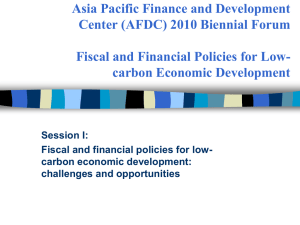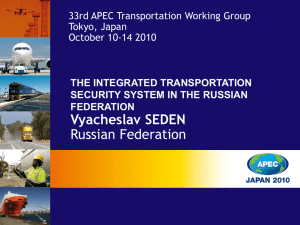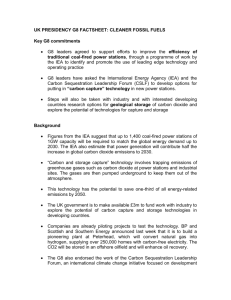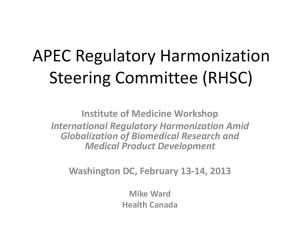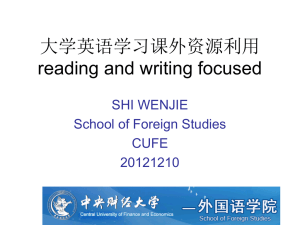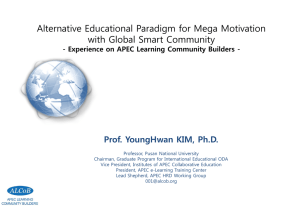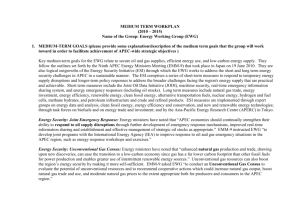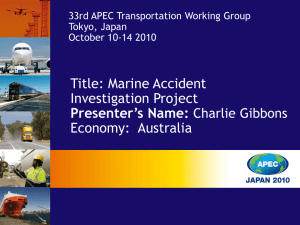Word
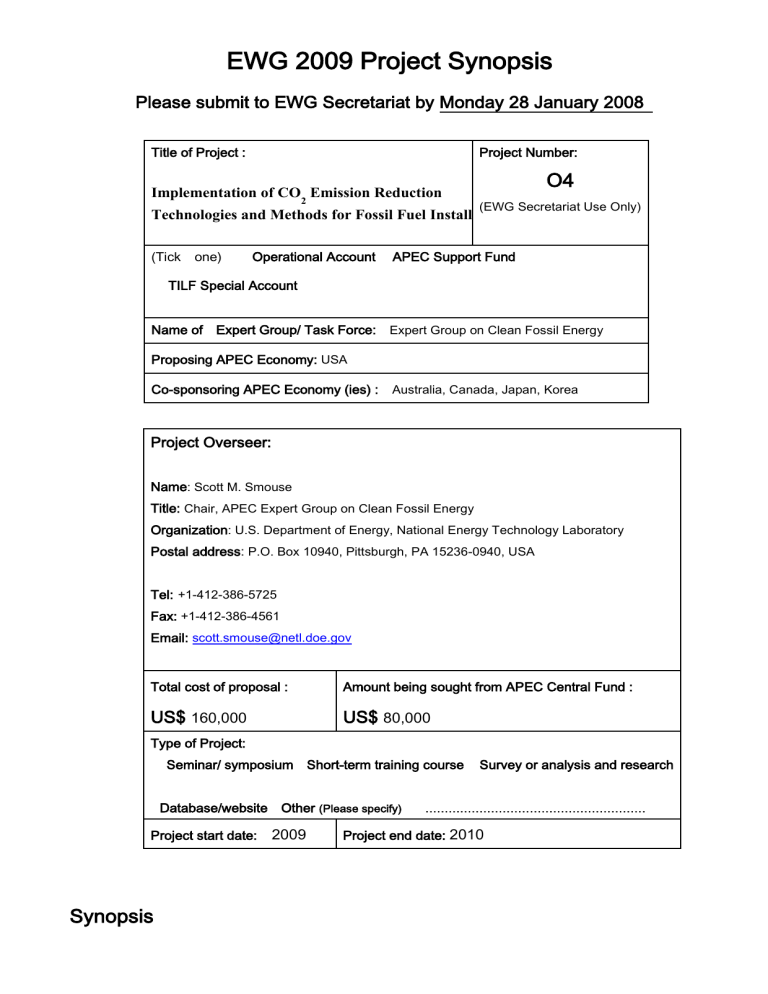
EWG 2009 Project Synopsis
Please submit to EWG Secretariat by Monday 28 January 2008
Title of Project : Project Number:
O4
Implementation of CO
2
Emission Reduction
(EWG Secretariat Use Only)
Technologies and Methods for Fossil Fuel Installations
(Tick one) Operational Account APEC Support Fund
TILF Special Account
Name of Expert Group/ Task Force:
Expert Group on Clean Fossil Energy
Proposing APEC Economy:
USA
Co-sponsoring APEC Economy (ies) :
Australia, Canada, Japan, Korea
Project Overseer:
Name
: Scott M. Smouse
Title:
Chair, APEC Expert Group on Clean Fossil Energy
Organization
: U.S. Department of Energy, National Energy Technology Laboratory
Postal address:
P.O. Box 10940, Pittsburgh, PA 15236-0940, USA
Tel:
+1-412-386-5725
Fax:
+1-412-386-4561
Email: scott.smouse@netl.doe.gov
Total cost of proposal : Amount being sought from APEC Central Fund :
US$
160,000
US$
80,000
Type of Project:
Seminar/ symposium Short-term training course Survey or analysis and research
Database/website Other (Please specify) …………………………………………………
Project start date:
2009
Project end date:
2010
Synopsis
Objective of Project:
This objective of this project proposal is to organize and hold, jointly with the International Energy Agency
(IEA), an International Conference on Implementation of CO
2
Emission Reduction Technologies and Methods for Fossil Fuel Installations. This event, which will be held during 2009, will bring together the results from several APEC projects on various aspects of power plant best practices, including renovation and modernization and efficiency improvement — all which result in increased and more reliable electricity generation, lower emissions of pollutants and carbon dioxide (CO
2
), and reduced operations and maintenance (O&M) costs leading to lower electricity tariff for consumers at all levels — from both existing and new coal-fired power plants in APEC economies. Its will focus on dissemination of information on reducing the contribution of fossil fuel power generation to greenhouse gas emissions, with the aim would be to help APEC developing economies improve the efficiency of power generation and reduce their emissions of CO
2
and other pollutants.
Methodology:
During the past few years, the APEC Expert Group on Clean Fossil Energy (EGCFE) has been conducting a number of inter-related projects on technological and other options to reduce present and future CO
2
emissions from electric power generation facilities in APEC economies. This has included work on coal-fired power plant upgrading and refurbishment options to improve plant efficiency, performance and reliability, as well as projects on new coal-fired power plants in APEC developing economies where coal use is on a rapid growth path, assessing what is needed to accelerate the uptake of clean coal technologies in these economies, and on improved environmental monitoring
1.
The IEA has been carrying out a number of activities related to cleaner fossil fuels, in response to a request by G8 Leaders at their Gleneagles Summit in 2005, which directed the IEA to review, assess, and disseminate widely information on energy efficiency of coal-fired power plants; and to recommend options to make best practice more accessible.
It also asked the IEA to make a global study of recently constructed plants to assess which ones are the most cost-effective and have the highest efficiencies and lowest emissions, and to disseminate this information widely.
The IEA response includes a coal-fired power database, assessment of upgrading and replacement of older coal-fired plants in major coal using economies (Australia, Brazil,
China, India, Indonesia, Germany, Japan, Korea, Poland, Russia, South Africa, Thailand, United Kingdom, and United States), and country-based coal-fired power sector reviews, new developments and case studies of equipment and plant upgrades in different regions aiming at efficiency improvement.
Given highly complementary nature of the work being undertaken by APEC and the IEA, and the timetable for implementation of the anticipated G8 recommendations on efficiency improvement, it will be highly beneficial, to both APEC and the IEA and their members, to jointly organize a conference on these issues. The EGCFE Chair has discussed this joint event with responsible program officials at the IEA, who have indicated very strong interest in cooperating with the EGCFE. The IEA is already planning a series of workshops in developing countries around the world and quickly concluded that a joint workshop in the Asia Pacific region would have much greater impact by bringing together key government and private sector officials from a greater number of economies who all are or need to focus on this issue. A high-profile joint event of this type would also be consistent with the broad objective of increasing IEA/APEC coordination and cooperation that has been expressed by Energy Ministers of the two organizations. The Declaration by APEC Energy Ministers meeting in Darwin in 2007 encouraged the development and implementation of APEC–IEA collaboration, and directed the EWG to further advance collaboration with the IEA and other international energy fora.
It would not be the first time that the two organizations (IEA and APEC/IEA) worked together. As part of a prior project series, the EGCFE organized an APEC workshop in 2004, on near-term options to reduce CO
2
emissions from coal-fired power plants in the region. This workshop was held in conjunction with a regional conference on
Zero Emission Technologies (ZETs) sponsored by the IEA’s Working Party on Fossil Fuels in Brisbane, Australia. The combined event benefited from the complementarity of the membership of the two organizations, and from substantial cofunding from industry and from the host economy.
Upon approval by APEC and the IEA, a consultant would be selected who would work with a steering team of EGCFE members and the IEA Secretariat or its representative, to organize and hold the conference, and publish the proceedings.
How does the project proposal align with EWG and APEC-wide priorities:
This project will strengthen regional energy security by preserving the coal option while creating essential conditions for improving environmental protection in the power generation sector.
The Declaration by APEC Energy Ministers meeting in Darwin in 2007 stated that improving energy efficiency is a cost-effective way to enhance energy security and mitigate greenhouse gas emissions, and Ministers encouraged the development of cleaner and more efficient power generation technologies.
APEC Economic Leaders, meeting in Sydney in September 2007, addressed the challenges of climate change, energy security and clean development, outlining their resolve on this issue in their Declaration on Climate Change, Energy Security and Clean Development, which included the following statements:
•
We, the APEC Economic Leaders, agree that economic growth, energy security and climate change are fundamental and interlinked challenges for the APEC region.
•
Our success has relied in part on secure supplies of energy, the use of which has also contributed to air quality problems and greenhouse gas emissions.
•
We are committed, through wide-ranging and ambitious actions, to ensuring the energy needs of the economies of the region while addressing the issue of environmental quality and contributing to the reduction of greenhouse gas emissions.
•
Fossil fuels will continue to play a major role in our regional and global energy needs,
Co-operation, including joint research, development, deployment and transfer of low and zero emission technologies for their cleaner use, particularly coal, will be essential.
• Improving energy efficiency is a cost-effective way to enhance energy security and address greenhouse gas emissions while promoting economic growth and development.
This project responds to the energy efficiency goals of APEC Energy Ministers, in that its overall objective is to contribute to mitigation of greenhouse gas emissions by dissemination of the most up-to-date information on CO
2
emission reduction by improving the efficiency of existing fossil fuel power generation, and by facilitating the uptake of clean and efficient coal technologies for new power generating plants.
The primary objective of the project is to contribute to mitigation of global climate change due to
CO
2 emissions by means of information transfer related to the environmentally sustainable use of coal for energy development in the APEC region. Global climate change is expected to impact agricultural production and the availability of water, and to cause sea levels to rise. These and other negative impacts of climate change more significantly impact the poor and disadvantaged, including often women. These sectors of human society are less able to afford to adapt to their changing surroundings.
To ensure that the women’s perspectives are adequately represented, active participation of and input by women into the project will be sought through the members of the EGCFE steering committee. Cooperation in this endeavour by representatives of the IEA will also be sought. The project itself will be carried out by a consultant in response to a tender. In its evaluation of submitted bids, specific attention will be given to qualified women proposed by the consultants to work on the project. The EGCFE members involved will ensure that the winning submission adheres to the priorities of the Framework for the Integration of Women in APEC (“Accelerate the progress of integrating women in the mainstream of APEC processes and activities” and “Promote and encourage the involvement of women in all APEC fora”). The APEC Framework, as well as the Gender Analysis Guide and other relevant documents, will be made available to those involved in the project; their application will be monitored throughout the project.
1
Reducing Trade, Regulatory, and Financing Barriers to Accelerate the Uptake of Clean Coal Technologies by
Developing Economies in the Asia Pacific Region [EWG 01-2008T]
How Can Environmental Regulations Promote Clean Coal Technology Adoption in APEC Developing Economies?
[EWG05-2006]
Environmental Monitoring for Coal-Fired Power Plants in Asian Developing APEC Economies [EWG06/2007]
Technology Status and Project Development Risks of Advanced Coal-Fired Power Generation Technologies in APEC
Developing Economies [EWG06-2007A ]
Lessons Learned in Upgrading and Refurbishing Older Coal-Fired Power Plants - A Best Practice Guide for
Developing APEC Economies [EWG05-2007]
INCORPORATING SUSTAINABLE DEVELOPMENT PRINCIPLES INTO EWG
PROJECTS
Process for incorporating sustainable development principles:
1.
Project Overseer complete self-assessment rating for each project proposal
2.
For APEC-funded projects, Project Overseer incorporates the principles into the project tender, tender assessment, and project implementation phases
3.
On completion of a project, the Project Overseer describes how the principles were addressed and their impact at the project evaluation phase (through a separate report).
SELF-ASSESSMENT RATING
Sustainable Development Principle
Project Link (1 point for each)
Supporting Information
Strengthening regional energy security
1
By disseminating information on improving the efficiency and performance of existing coal-fired power plants, and on means of ensuring the accelerated deployment of cost-effective clean coal technologies for new fossil power generation, this project will strengthen regional energy security by preserving the coal option while addressing the climate change issue.
Supporting energy market reform and energy infrastructure development
1
The project will develop information that provides incentives for cleaner coal technology in new and existing power generation infrastructure.
Promoting uptake of clean and efficient energy and efficient use of energy
1
This project will promote the uptake of cleaner and more efficient coal power generation technologies, as well as improvement of the efficient use of energy in existing power plants.
Building capacity and technical cooperation within APEC economies
1
This project will help member economies build capacity in clean coal technologies as well as power plant upgrading, and provide opportunities for technical cooperation on clean coal infrastructure development.
Building public-private partnerships and strengthening stakeholder engagement, including with the
APEC business community
1
The project will strengthen public-private sector dialog and encourage selection of clean coal technologies for new and upgraded power plants, with private sector involvement in APEC economies.
TOTAL SCORE
5
